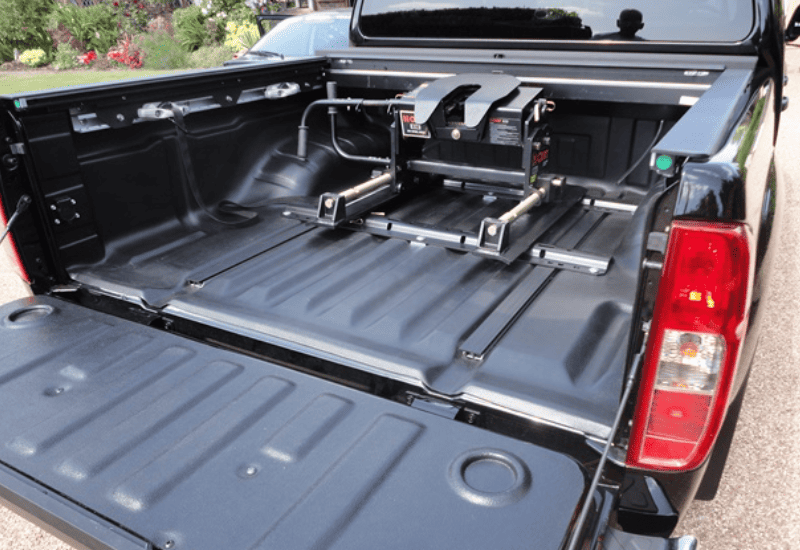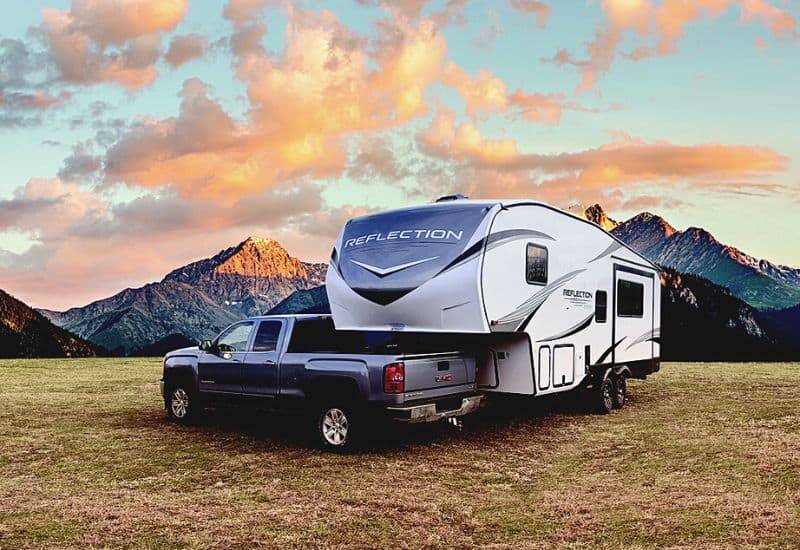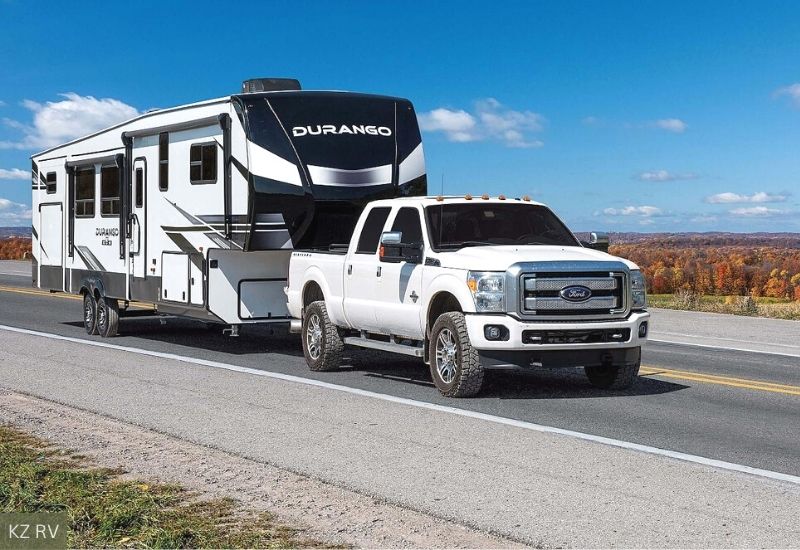Are you thinking about purchasing a 5th wheel or travel trailer and wondering which one is easier to tow?
This is a question that many RVers have, and it’s definitely an important one.
Because which option you choose can have a big impact on your overall towing experience.
As a seasoned RVer, I’ve been in your shoes, contemplating RV towing and all its complexities.
And probably the thing I’ve learned the most is that RV towing isn’t always clear-cut, as there are many “it depends” scenarios while towing an RV.
The good news, however, when it comes to whether 5th wheels are easier to tow than travel trailers, the answer is pretty straightforward.
As 5th wheels are generally easier to tow compared to travel trailers for a variety of reasons, which we’ll explore in the rest of this blog post.
1. Improved Stability
One of the biggest reasons why 5th wheels are easier to tow than travel trailers is their improved stability.
This enhanced stability is largely due to the design of fifth-wheel campers, which allows for a more stable towing experience, thanks to the hitch point location.
Unlike travel trailers that connect to a hitch at the back of the tow vehicle, a 5th wheel attaches directly over the rear axle of your truck.
Which provides several stability improvements.
Starting with better load distribution.
Positioning the hitch over the rear axle more evenly distributes the weight of the camper between the trailer and the tow vehicle. This balanced weight distribution helps to maintain control of the vehicle, especially when driving at highway speeds or during sudden stops.
In addition, it significantly reduces the strain on the tow vehicle, leading to less wear and tear over time.
Another reason is that the configuration reduces sway.
Sway, or the side-to-side movement of a trailer can be very unnerving, especially during windy conditions or when large vehicles like semi trucks pass by.
With a 5th wheel, the sway is greatly minimized due to the hitch’s location and the way the weight is distributed.
Which is especially beneficial for new RVers and those nervous about towing a large trailer.
The final benefit is that offers more predictable handling.
When you’re towing a 5th wheel, the response to steering is more immediate and controlled, largely due to the direct connection over the rear axle.
This leads to a feeling of the trailer and tow vehicle moving as one unit, unlike the sometimes disjointed feeling you might get with a travel trailer.
2. Easier Maneuverability
Improved maneuverability is another key benefit that makes towing a 5th wheel easier than towing a travel trailer.
This is due to the hitch point location of a 5th wheel compared to a travel trailer.
Unlike travel trailers, which have the hitch or pivot point located at the rear bumper, 5th wheels position it over the truck’s rear axle.
Which provides several benefits.
Including tighter turns, more responsive steering, easier backing, and a more predictable camper path while towing.
Since the pivot point is closer to the center of the towing vehicle, you can make tighter turns.
This is particularly useful in tight campgrounds, narrow roads, sharp bends, or when making U-turns.
The direct connection over the rear axle means that any movement in the steering wheel is more accurately translated to the trailer.
This responsiveness gives the driver a greater sense of control and precision, which is especially helpful when navigating traffic or avoiding obstacles on the road.
Backing up a 5th wheel is also generally easier and simpler than a travel trailer, as the hitch’s position gives the driver better control over the trailer’s direction while in reverse.
This can be a huge relief, particularly for those who find reversing with a trailer challenging.
The improved control makes it easier to back into camping spots or driveways.
It also means less guesswork for the driver.
3. Better Weight Distribution
One of the biggest issues with travel trailer towing, or bumper pull towing, is weight distribution, especially for larger travel trailers.
This is why travel trailers require weight distribution hitches.
Because without them, they’re prone to swaying and even fishtailing.
Which can be unnerving and scary for the driver and lead to an out-of-control rig.
With fifth wheels, however, the camper’s weight is more evenly distributed between the tow vehicle and the trailer, reducing the risk of sway and fishtailing.
In addition, the hitching point of a fifth wheel also creates a more stable center of gravity, which is why drivers often say that towing a fifth wheel feels more like driving a single unit, rather than towing a separate trailer.
4. Improved Safety

The hitch design of a 5th-wheel trailer offers improved safety compared to a bumper hitch used with travel trailers.
This is due to its more robust connection point, as the 5th wheel hitch connects to a large U-shaped coupling mounted in the truck bed rather than at the rear bumper.
Which provides several key advantages, including enhanced stability, a stronger connection point, and a more stable towing experience.
Plus, as an added bonus, many RVers find the process of connecting and disconnecting a 5th-wheel trailer simpler and quicker compared to a travel trailer.
5. Reduced Jackknife Risk
While not common in the RV world, anytime you’re pulling a trailer behind a tow vehicle there is always a risk of jackknifing.
This can occur if the vehicle towing the trailer skids and the trailer pushes the vehicle from behind, spinning the tow vehicle around until it’s facing backward.
It’s called jackknifing because when this occurs the configuration resembles a folding pocket knife.
The good news, however, when it comes to 5th wheels, jackknifing is much less likely.
For two main reasons, firstly, the hitch weight of a 5th wheel tends to be much higher compared to that of a travel trailer, and this added weight significantly reduces the likelihood of skidding in the tow vehicle.
The second reason is that unlike travel trailers, which attach to the rear of the tow vehicle, 5th wheels connect directly over the rear axle.
This means that not only does the 5th wheel place more weight on the tow vehicle but it does so in the best possible location, which is directly over the rear axle of the tow vehicle.
Further reducing the likelihood that the tow vehicle will skid while towing.
6. Smoother Ride
Anyone who has towed a travel trailer and a fifth wheel will tell you that towing a 5th wheel provides a much smoother ride and towing experience.
This difference again is largely due to the hitching point of the 5th wheel directly over the truck’s rear axle.
As this configuration allows the trailer’s weight to be more evenly distributed between the truck and the trailer.
As a result, you’ll experience less sway and a more balanced towing experience, especially in challenging driving conditions like strong winds or uneven roads.
It’s not just the connection point location that allows 5th wheels to provide a smoother ride, however, as it also has a lot to do with the hitching mechanism itself.
This mechanism involves both the 5th wheel hitch or pin box and the hitch receiver inside the truck bed.
The hitch receiver provides a stable base for the 5th wheel, which reduces stress on the vehicle and contributes to a smoother ride.
In addition, the 5th wheel hitch receiver depending on the model will include either an articulating head or a yoke with two pivot points, which allow for smoother motion between the truck and trailer and help to absorb road shock.
Which is particularly useful on uneven terrain, as it minimizes the jarring and bouncing that can be transmitted to the truck.
Likewise, the 5th wheel’s hitch or pin box also plays a role in providing a smoother towing experience.
Thanks to common features like a cushioned pin box, which provides a more comfortable tow, a rubber shear spring, which absorbs and dampens vibration and reduces chucking, and internal glide pads, which allow the skid plate to shift around for smoother maneuvering and reduced chucking.
7. Tighter Turning Radius

The final reason why 5th wheels are easier to tow than travel trailers is the tighter turning radius they offer.
This enhanced maneuverability is a significant advantage, especially when navigating through tight spots or making sharp turns in confined spaces like campgrounds or narrow roads.
Since the hitch point on a 5th wheel is located over the truck’s rear axle, it allows the trailer to follow the tow vehicle’s path more closely.
Unlike travel trailers, which are hitched at the back of the vehicle, causing the rig to turn wider.
This difference in hitch positioning means that with a 5th wheel, you can make sharper turns without worrying about the trailer swinging as wide.
Additionally, this tighter turning radius reduces the risk of the trailer clipping obstacles on the inside of the turn, a common concern when maneuvering large vehicles.
Additional 5th Wheel Resources
- What is the Lightest 5th Wheel? Solved
- The 8 Lightest 5th Wheel Toy Haulers You Can Buy!
- 12 Best 5th Wheels Under 30 Feet (With Pricing)
Recent Posts
When cruising down the highway in your RV, the last thing you want is a tire blowout! Not only is it dangerous, but RV tire replacement isn't cheap, costing $200 to $300 per tire. The good news,...
Nothing ruins an RV adventure faster than a breakdown with no way to fix it. Because of this, every RVer should have a well-stocked RV tool kit for those unexpected roadside emergencies and campsite...

